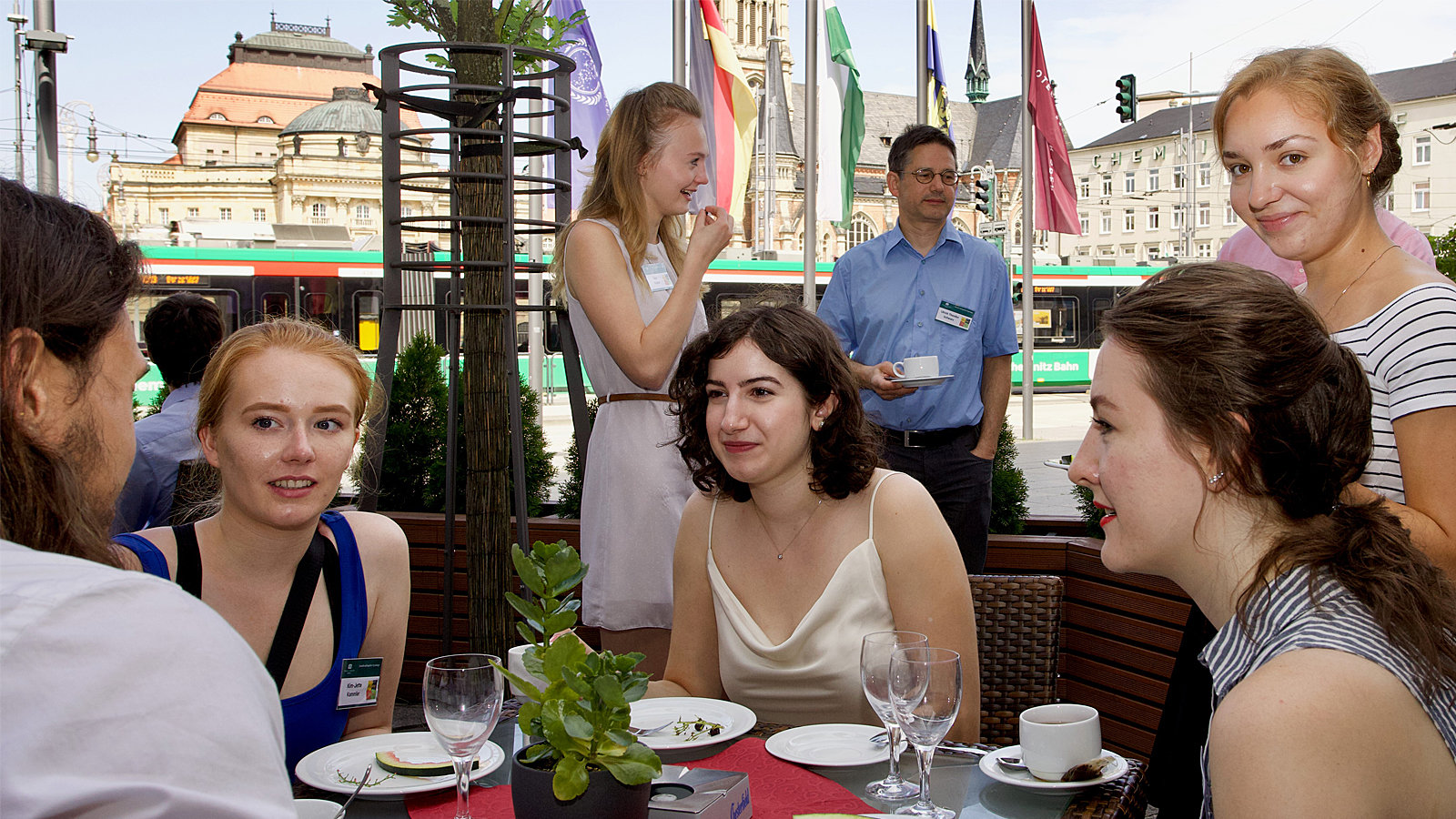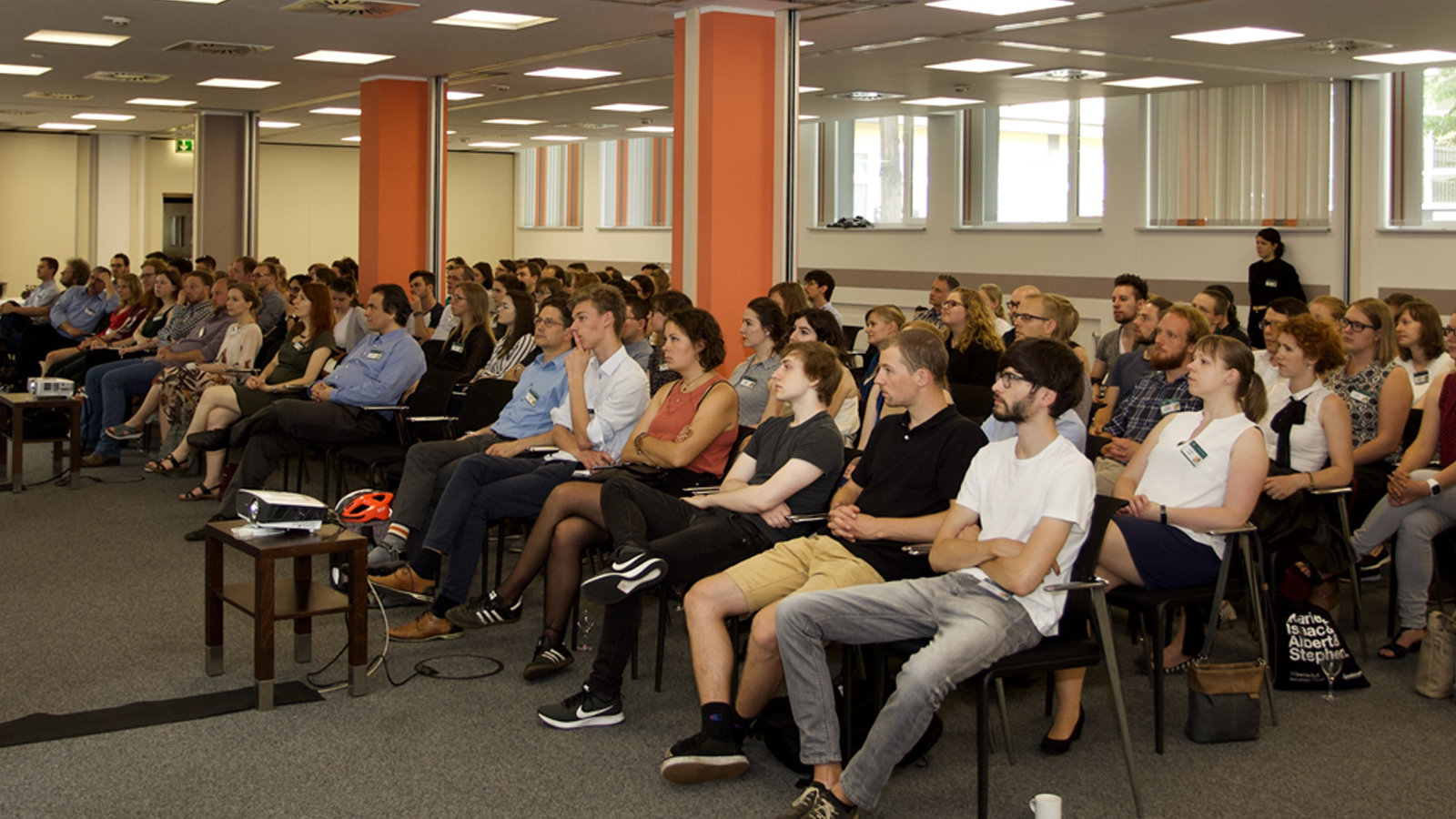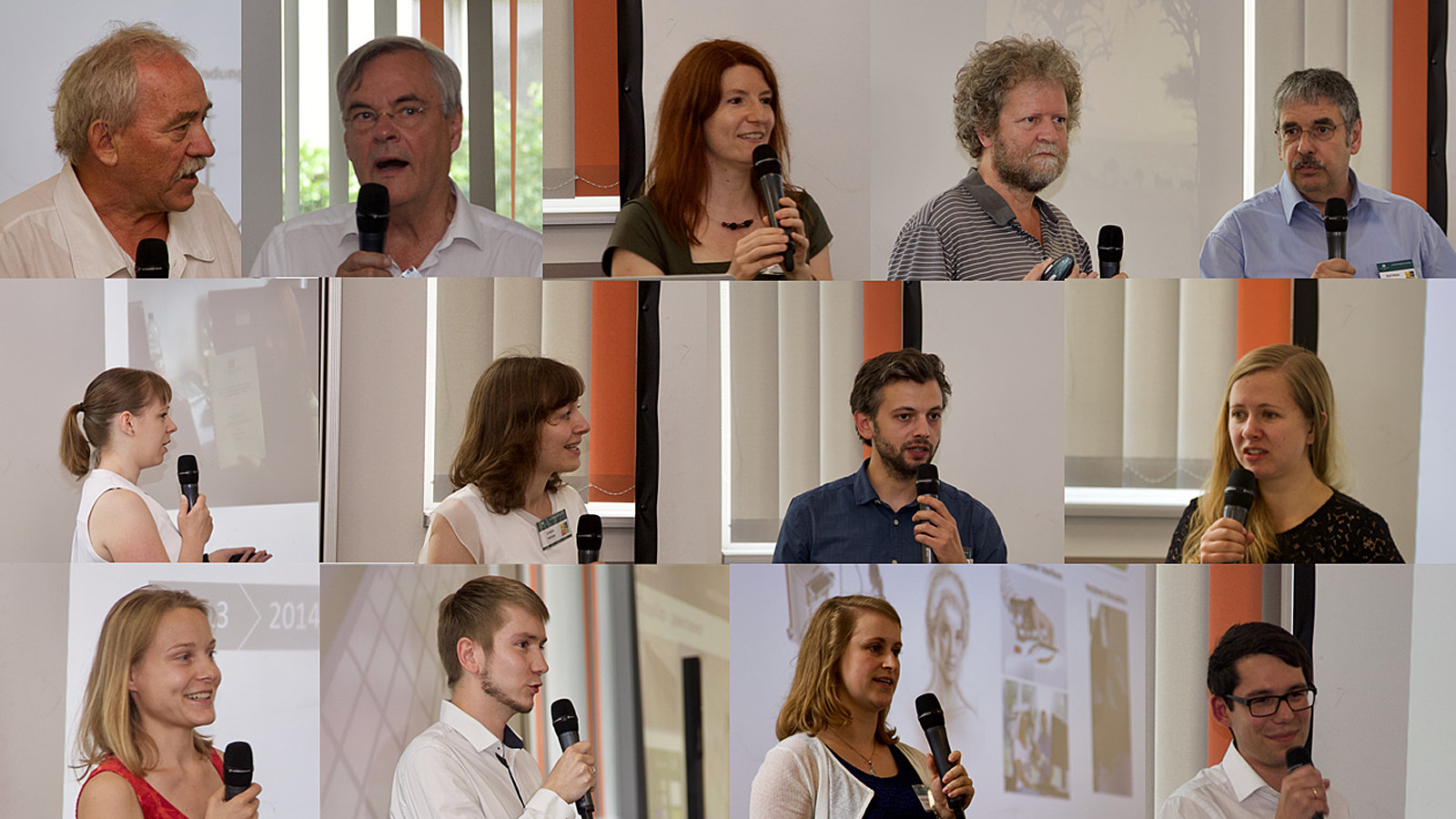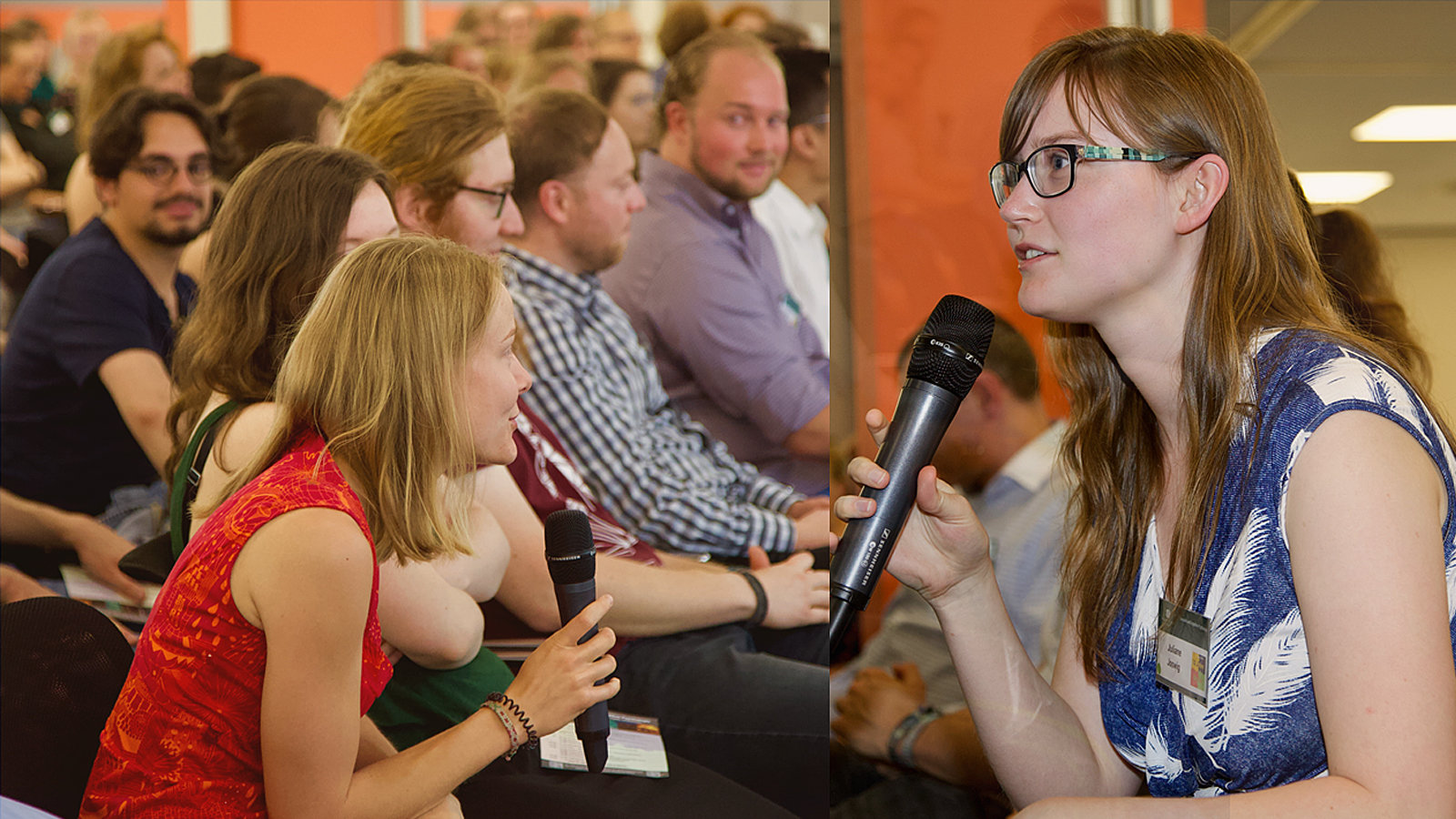“I Would Do It Again” – Successful Careers, Thanks to the Chemnitz “SeKo” Programme
The interdisciplinary study programme in Sensors and Cognitive Psychology (“SeKo”) celebrated its 10th anniversary at Chemnitz University of Technology – and alumni shared insights on their experiences
-

In addition to presentations, participants took the opportunity to develop and widen their contact networks. Some students have without a doubt found their next internship, thesis, or even future employer during the convention. Photo: Institute of Physics / Chemnitz University of Technology -

120 students and alumni of the SeKo programme came together to celebrate its 10th anniversary. Photo: Institute of Physics / Chemnitz University of Technology -

Eight alumni of the programme gave presentations on their careers. The celebration was framed by a review of the founding of the programme by its initiators, a look at its future prospects, given by the Dean of Studies, and a guest lecture. Top row, from left to right: Prof. Dr. Josef Krems, Prof. Dr. Christian von Borczyskowski, Prof. Dr. Alexandra Bendixen, Prof. Dr. Markus Lappe, Prof. Dr. Karl Heinz Hoffmann. Middle row, from left: Jennifer Brade, Carolin Hübner, Philipp Stiens, Maria Kremsreiter. Bottom row, from left to right: Anna Dietze, Nick Baer, Bettina Trunk, Lucas da Silva. Photo: Institute of Physics / Chemnitz University of Technology -

After each presentation, there were lively exchanges between current and former SeKo students, exchanges which brought new and interesting perspectives to their studies or professional activities. Photo: Institute of Physics / Chemnitz University of Technology
June 2019 marked the 10th anniversary of the degree programme “Sensors and Cognitive Psychology” (“SeKo”) at Chemnitz University of Technology, and the programme celebrated with a large conference. Around 120 current and former students came together to exchange experiences, gather ideas for their own career choices, and reconnect with colleagues. The SeKo Bachelors programme was awarded a Chemnitz University of Technology Teaching Award in 2018. The award honoured its unique-to-Germany mixture of psychological and physical-technical components, and the high level of engagement on behalf of the instructors.
The conference began with a review of the origins of the study programme. Three of the former initiators – Prof. Dr. Christian von Borczyskowski, Prof. Dr. Karl Heinz Hoffmann and Prof. Dr. Josef Krems – talked about the initial scepticism and at the same time, curiosity, of the participating faculties and institutes during the first steps in the new programme. The original vision involved setting up a new and unique programme that stood at the interface between psychology and physics, and proved to be a decision of immense vision – today, it seems obvious that the interaction between man and technology is one of the central challenges in our world and in our everyday lives. Graduates of the programme are now well-equipped to not only understand this interaction but to actively shape it.
Dean of Studies Prof. Dr. Alexandra Bendixen, in delivering her view of the future of the programme, noted that SeKo excels at quickly responding and adapting to rapidly growing areas of research and development – she emphasised the special importance of the interaction between teachers and students, who from the outset have taken active roles in the shaping of the programme. The variety of possibilities available to students with a SeKo degree was made quite evident by the lectures given by eight alumni.
First, Jennifer Brade discussed the interdisciplinary opportunities available at Chemnitz University of Technology. With her SeKo degree, she has been able to fit seamlessly into a workgroup at the Faculty of Mechanical Engineering, where she now serves as second head of the Division for "Simulation, Visualization and Integration. In addition to the broad professional training offered in the programme, she also benefits from the skills she developed in the SeKo programme that gave her the ability to think quickly and flexibly, from the perspective of multiple disciplines.
This feature of the SeKo programme was also highlighted by Lucas da Silva, who as a back-end developer in the automotive sector frequently leads interdisciplinary teams and often serves as a “mediator” between the different disciplines. Maria Kremsreiter, who works in the same company but in the area of front-end development, is responsible for, among other things, the efficient testing of parking sensors. She emphasised the importance of keeping and maintaining contacts that you have already established in the industry and in the region. In order to enable this for future SeKo graduates, she happily offers internships and final theses to current students, and confirmed what was repeated by other speakers, namely that SeKo graduates are currently very much in demand, in a variety of fields.
Carolin Hübner spoke of a particular strength of the programme, that its diversity allows students to try out different paths and different areas of research. She is now working on her Doctorate on “Perception and Oculomotor Skills” at the University of Marburg, via her bachelor’s thesis on “Information from a Physical Perspective” and her master’s thesis on “Human Decision-Making” and a research internship on group behaviour in ants. The SeKo programme provided her with the foundation to be able to try out many ideas and still find and maintain a higher perspective within her work.
Anna Dietze is also active in university-level research. After receiving her SeKo bachelor’s degree, she was admitted to the highly competitive, international master’s programme in neurosciences at Ludwig Maximilian University Munich, where she has already been able to actively contribute in numerous fields of research. As was her focus in Chemnitz, she is now engaged in auditory research – a field in which the interaction between physics and psychology plays a large role. Dietze also spoke highly of the variety of interests that she was able to cultivate during her studies, via the broad foundation of knowledge laid by the SeKo programme.
Although there is no clinical component to the SeKo programme, the technical knowledge gained allowed for positive experiences in various medical applications, reported Bettina Trunk. She works with stroke patients and develops and tests new rehabilitation procedures. The acquisition of necessary background knowledge was no problem after her SeKo degree, reported Trunk. In basic psychological research at the University of Jena, Philipp Stiens works with, among other things, the cognitive processes that are related to the causation of actions. Here, he uses, among other things, virtual reality. In this area in particular, the technical components of his SeKo studies gave him an advantage right away, when compared to graduates of most standard psychology courses.
Nick Baer has been working in a medium-sized start-up in Chemnitz, and is also currently pursuing his doctorate at Chemnitz University of Technology. Like the other speakers, Baer is certain that the SeKo programme laid a strong foundation for his successful career. He summed this up with the statement that at any time he would do it again – a sentiment echoed by other alumni present at the convention.
The day was rounded off with a guest lecture by Prof. Dr. Markus Lappe (University of Münster) on the topic of “Visual Ecology of Motion”. In this, he used an example of the perception of movement, and demonstrated how deeply linked psychology and physics are in the field of perceptual research and its application. As a physicist who holds a psychology chair, Lappe was enthusiastic in his support of the SeKo degree programme and its graduates, and he wished that there had already been a comparable programme while he was pursuing his studies.
Further information on the SeKo study programme at Chemnitz University of Technology is available online. For Winter Semester 2019/2020, there are still places available in both the bachelor’s and master’s programmes.
For more information, please contact Prof. Dr. Alexandra Bendixen, Phone 0371 531-31681, E-mail alexandra.bendixen@physik.tu-chemnitz.de.
(Article: Matthias Fejes / Translation: Jeffrey Karnitz)
Matthias Fejes
20.08.2019




